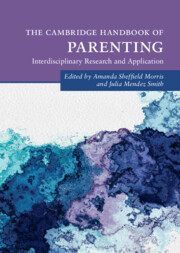Book contents
- The Cambridge Handbook of Parenting
- Cambridge Handbooks in Psychology
- The Cambridge Handbook of Parenting
- Copyright page
- Dedication
- Contents
- Contributors
- Figures
- Tables
- Introduction
- Part I Foundations of Parenting
- Part II Parenting across Development: Social, Emotional, and Cognitive Influences
- 8 Bolstering the Bond: Policies and Programs That Support Prenatal Bonding and the Transition to Parenting
- 9 Parenting during Infancy and Early Childhood
- 10 Parenting That Promotes Positive Social, Emotional and Behavioral Development in Middle Childhood
- 11 Parenting Adolescents
- 12 Parenting during Emerging Adulthood
- Part III Parental Factors That Impact Parenting
- Part IV Child Factors that Impact Parenting
- Part V Parent Education, Intervention and Policy
- Index
- References
12 - Parenting during Emerging Adulthood
from Part II - Parenting across Development: Social, Emotional, and Cognitive Influences
Published online by Cambridge University Press: 01 December 2022
- The Cambridge Handbook of Parenting
- Cambridge Handbooks in Psychology
- The Cambridge Handbook of Parenting
- Copyright page
- Dedication
- Contents
- Contributors
- Figures
- Tables
- Introduction
- Part I Foundations of Parenting
- Part II Parenting across Development: Social, Emotional, and Cognitive Influences
- 8 Bolstering the Bond: Policies and Programs That Support Prenatal Bonding and the Transition to Parenting
- 9 Parenting during Infancy and Early Childhood
- 10 Parenting That Promotes Positive Social, Emotional and Behavioral Development in Middle Childhood
- 11 Parenting Adolescents
- 12 Parenting during Emerging Adulthood
- Part III Parental Factors That Impact Parenting
- Part IV Child Factors that Impact Parenting
- Part V Parent Education, Intervention and Policy
- Index
- References
Summary
In the minds of many parents and in the eyes of the law in many countries, becoming an adult is signified by turning age 18. As nice as it might be to think that simply turning a certain age automatically equips an individual with all of the knowledge, skills, and abilities requisite to independently and successfully navigate adulthood, the reality is that becoming an adult is a process. As such, parents continue to play an important role in the process of their children becoming adults. The purpose of this chapter is to examine the many important ways that parents still matter in the lives of their children during emerging adulthood. In order to do this, first, a theoretical and developmental foundation will be provided for why it is important to consider the contributions of parents during emerging adulthood (ages 18-29). Next, a review of the literature will show the specific ways in which parenting is linked to emerging adults’ flourishing and floundering, respectively, including the role that culture may play in these relations. Finally, the chapter will include a framework for parents to think about how to parent during this time.
Keywords
- Type
- Chapter
- Information
- The Cambridge Handbook of Parenting , pp. 259 - 278Publisher: Cambridge University PressPrint publication year: 2022

